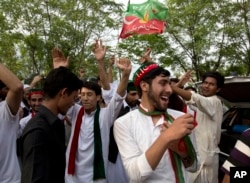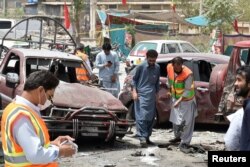Former cricket star Imran Khan has declared victory for his political party in Pakistan’s general elections.
Pakistani television stations say Khan’s PTI party, has a commanding lead in the voting. But the national election commission has yet to release official results.
Khan, who hopes to be Pakistan’s next prime minister, said in a statement “thanks to God, we won and we were successful.”
His supporters celebrated outside party offices across the country. Many of them were young men, who danced to the sound of beating drums covered in the PTI’s black and green-colored flags.
Khan’s message of a “new” Pakistan appealed to young voters in Pakistan – a country where the United Nations says 64 percent of its people are below the age of 30.
At least 10 television stations in Pakistan reported that the PTI won as many as 119 of the 270 contested seats in the National Assembly. The 342-seat assembly has seats reserved for women and minorities.
Khan’s leading opponent, Shahbaz Sharif of the Pakistan Muslim League, rejected the election results as the votes were being counted.
Sharif wrote on Twitter that “had the public mandate been delivered in a fair manner, we would have accepted it happily.”
The independent Human Rights Commission reported that in some places, women were not permitted to vote. In other areas, it said, “polling staff appeared to be biased toward a certain party,” without naming the party.
In the days before the elections, rights activist I.A. Rehman called the campaign “the dirtiest” in Pakistan’s push toward democracy.
The vote was held on Wednesday. The same day, a suicide bomber attacked a voting station in Quetta, the capital of Baluchistan Province. Thirty-one people were killed.
Earlier this month, a suicide bomber struck at a political campaign event in the same province, killing 149 people and wounding 400 others. The Islamic State group claimed responsibility for that attack.
The election marked only the second time in Pakistan’s 71-year history that a civilian government is handing power to another in the country.
The armed forces have directly or indirectly ruled Pakistan for most of the country’s history. The military had placed 350,000 troops at 85,000 voting stations for the general elections.
There have been concerns expressed over the military’s influence during the campaign.
A Pakistani military spokesman called accusations of interference harmful “propaganda.”
I'm Jonathan Evans.
Kathy Gannon and Zarar Khan reported this story for the Associated Press. Hai Do adapted their report for VOA Learning English. George Grow was the editor.
Write to us in the Comments Section or on our Facebook page.
______________________________________________________________
Words in This Story
contest - v. to try to win
reserve - v. to keep something for special use
mandate - n. the power to act that voters give to their elected leaders
deliver - v. to give control to a person or group
manner - n. the way that something is done or happens
staff - n. a group of people who work for an organization
bias - v. to have a strong and often unfair influence on someone or something







